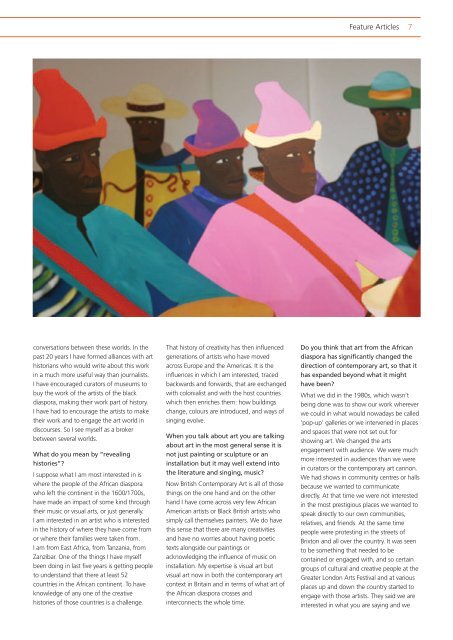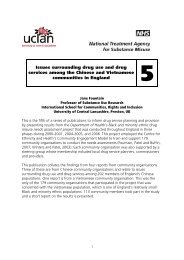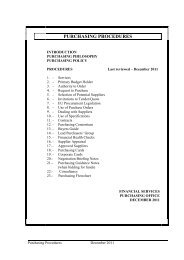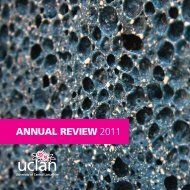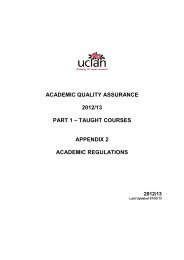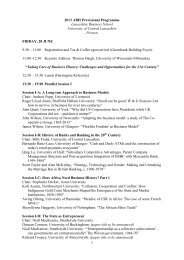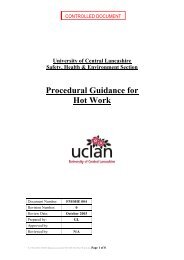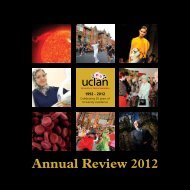Autumn 2011 Issue - University of Central Lancashire
Autumn 2011 Issue - University of Central Lancashire
Autumn 2011 Issue - University of Central Lancashire
You also want an ePaper? Increase the reach of your titles
YUMPU automatically turns print PDFs into web optimized ePapers that Google loves.
Feature Articles<br />
7<br />
conversations between these worlds. In the<br />
past 20 years I have formed alliances with art<br />
historians who would write about this work<br />
in a much more useful way than journalists.<br />
I have encouraged curators <strong>of</strong> museums to<br />
buy the work <strong>of</strong> the artists <strong>of</strong> the black<br />
diaspora, making their work part <strong>of</strong> history.<br />
I have had to encourage the artists to make<br />
their work and to engage the art world in<br />
discourses. So I see myself as a broker<br />
between several worlds.<br />
What do you mean by “revealing<br />
histories”?<br />
I suppose what I am most interested in is<br />
where the people <strong>of</strong> the African diaspora<br />
who left the continent in the 1600/1700s,<br />
have made an impact <strong>of</strong> some kind through<br />
their music or visual arts, or just generally.<br />
I am interested in an artist who is interested<br />
in the history <strong>of</strong> where they have come from<br />
or where their families were taken from.<br />
I am from East Africa, from Tanzania, from<br />
Zanzibar. One <strong>of</strong> the things I have myself<br />
been doing in last five years is getting people<br />
to understand that there at least 52<br />
countries in the African continent. To have<br />
knowledge <strong>of</strong> any one <strong>of</strong> the creative<br />
histories <strong>of</strong> those countries is a challenge.<br />
That history <strong>of</strong> creativity has then influenced<br />
generations <strong>of</strong> artists who have moved<br />
across Europe and the Americas. It is the<br />
influences in which I am interested, traced<br />
backwards and forwards, that are exchanged<br />
with colonialist and with the host countries<br />
which then enriches them: how buildings<br />
change, colours are introduced, and ways <strong>of</strong><br />
singing evolve.<br />
When you talk about art you are talking<br />
about art in the most general sense it is<br />
not just painting or sculpture or an<br />
installation but it may well extend into<br />
the literature and singing, music?<br />
Now British Contemporary Art is all <strong>of</strong> those<br />
things on the one hand and on the other<br />
hand I have come across very few African<br />
American artists or Black British artists who<br />
simply call themselves painters. We do have<br />
this sense that there are many creativities<br />
and have no worries about having poetic<br />
texts alongside our paintings or<br />
acknowledging the influence <strong>of</strong> music on<br />
installation. My expertise is visual art but<br />
visual art now in both the contemporary art<br />
context in Britain and in terms <strong>of</strong> what art <strong>of</strong><br />
the African diaspora crosses and<br />
interconnects the whole time.<br />
Do you think that art from the African<br />
diaspora has significantly changed the<br />
direction <strong>of</strong> contemporary art, so that it<br />
has expanded beyond what it might<br />
have been?<br />
What we did in the 1980s, which wasn’t<br />
being done was to show our work wherever<br />
we could in what would nowadays be called<br />
‘pop-up’ galleries or we intervened in places<br />
and spaces that were not set out for<br />
showing art. We changed the arts<br />
engagement with audience. We were much<br />
more interested in audiences than we were<br />
in curators or the contemporary art cannon.<br />
We had shows in community centres or halls<br />
because we wanted to communicate<br />
directly. At that time we were not interested<br />
in the most prestigious places we wanted to<br />
speak directly to our own communities,<br />
relatives, and friends. At the same time<br />
people were protesting in the streets <strong>of</strong><br />
Brixton and all over the country. It was seen<br />
to be something that needed to be<br />
contained or engaged with, and so certain<br />
groups <strong>of</strong> cultural and creative people at the<br />
Greater London Arts Festival and at various<br />
places up and down the country started to<br />
engage with those artists. They said we are<br />
interested in what you are saying and we


